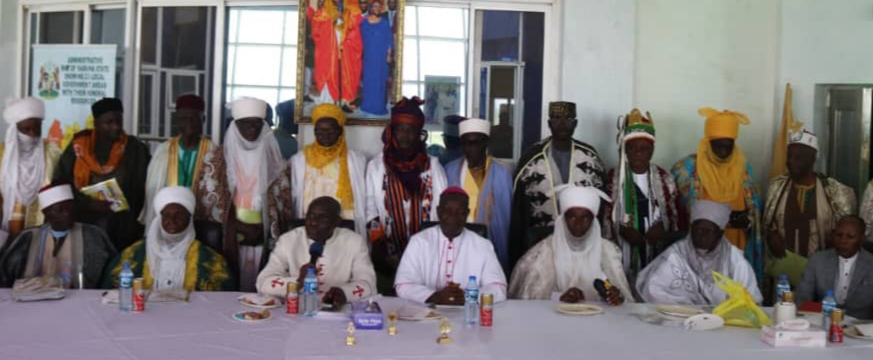A Historic Confluence: Southern Kaduna Leaders Unite for Peace and Progress
In a remarkable display of unity and a pivotal moment for the troubled region of Southern Kaduna, traditional rulers, Christian leaders, and prominent Islamic clerics converged in Kafanchan for a high-level peace summit. This unprecedented gathering, convened by the Southern Kaduna Christian Leaders Association in collaboration with Islamic leaders, signifies a turning point in the region’s long and arduous struggle with ethno-religious tensions. The summit, held on Thursday, brought together influential figures from diverse ethnic and religious backgrounds, signaling a collective resolve to transcend past grievances and forge a path towards lasting peace and sustainable development. The event marks a crucial step towards institutionalizing peacebuilding mechanisms and involving traditional authorities in fostering harmony.
The catalyst for this historic meeting was the growing concern about Southern Kaduna’s fragile peace and the recognition that sustained collaboration was paramount to prevent further unrest. Apostle Emmanuel Kure, the Chairman of the Southern Kaduna Christian Leaders and convener of the summit, emphasized the urgent need for unity and reconciliation. Recognizing the changing times and the potential for missed opportunities if old divisions persisted, he stressed that the gathering’s primary objective was to mend broken bridges and restore trust among the diverse communities of Southern Kaduna. This call for unity resonated deeply with the attendees, highlighting a shared desire for a future where peace and progress reign supreme.
The summit witnessed a powerful demonstration of interfaith solidarity, as Christian and Muslim leaders stood shoulder to shoulder, demonstrating their commitment to a shared vision of peace. Traditional rulers, representing the region’s rich cultural tapestry, lent their unwavering support to the initiative. The Emir of Jama’a, Alhaji Muhammadu Muhammadu II, and the Chief of Kagoro, Dr. Ufuwai Bonnet, spoke on behalf of their fellow monarchs, praising the religious leaders for their foresight and dedication. They described the summit as both timely and essential for the survival and well-being of the people of Southern Kaduna, emphasizing the critical need for unity and collaboration to overcome the challenges facing the region.
The Emir of Jama’a’s powerful message underscored the imperative of unity. He highlighted the summit as not just commendable but absolutely crucial for the survival and prosperity of the people. Dr. Ufuwai Bonnet echoed this sentiment, urging all leaders and stakeholders to transcend partisan and ethnic interests for the greater good of unity. He emphasized the strength that comes from collective action, declaring that a united Southern Kaduna would be an unstoppable force for progress.
The summit’s inclusive approach extended beyond religious and traditional leaders. Elders, community influencers, and representatives from various groups were also present, adding their voices to the chorus of hope and optimism for a peaceful future. Their presence signaled a broad-based commitment to the peace process and the belief that the summit could usher in a new era of inter-ethnic and inter-religious cooperation. This diverse group recognized the transformative potential of the meeting, envisioning it as a springboard for lasting peace and collaborative development.
The Kafanchan summit is not an isolated event but part of a wider strategy to embed peacebuilding within the fabric of Southern Kaduna’s society. Plans are underway to establish regular dialogue forums and joint development committees, ensuring continuous engagement and collaboration among diverse stakeholders. These initiatives reflect a commitment to moving beyond symbolic gestures towards concrete actions that can foster sustainable peace and address the root causes of conflict.
Participants at the summit also called upon the Kaduna State Government and security agencies to actively support and reinforce the peace initiative. They emphasized the need for government backing to implement the resolutions reached during the meeting, ensuring that the momentum for peace translates into tangible improvements in the lives of the people of Southern Kaduna. This call for government support recognizes the crucial role that state institutions play in creating an environment conducive to lasting peace and development.
The peace summit in Kafanchan represents a historic turning point, showcasing the potential for unity and collaboration to overcome long-standing divisions. It serves as a beacon of hope for a region plagued by conflict, demonstrating that dialogue, understanding, and a shared commitment to peace can pave the way for a brighter future. The challenge now lies in translating the summit’s positive energy into concrete actions that will bring lasting peace and prosperity to Southern Kaduna. The collective efforts of religious leaders, traditional rulers, government officials, and community members will be crucial in achieving this ambitious goal. The summit has laid the foundation for a new chapter in Southern Kaduna’s history, where collaboration and mutual respect replace conflict and mistrust.














